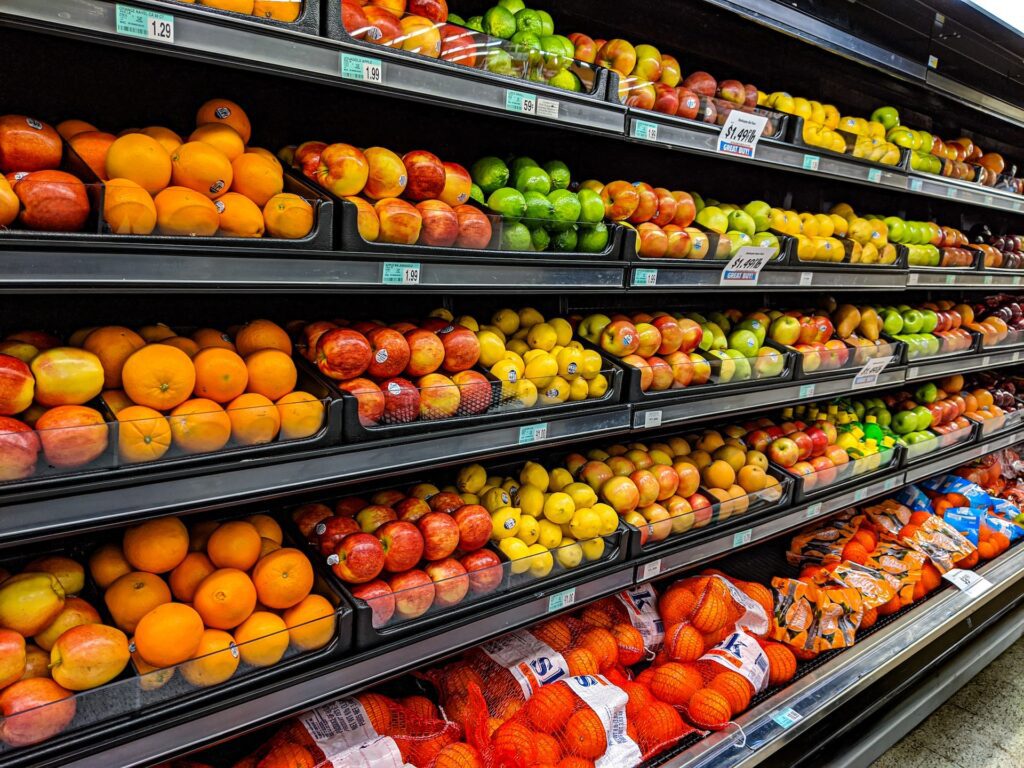Melissa Mitri, MS, RD, is a registered dietitian nutritionist, weight loss specialist, and expert health writer with over 15 years of experience in the health and wellness industry. Melissa has worked in a variety of healthcare settings where she helps clients improve their diet through an individualized approach.
Are you on a tight food budget? You may think planning healthy meals on a budget isn’t possible, especially with rising food costs and inflation.
And while it may seem that fruits and veggies are more pricey than potato chips, this is not the case. With a little planning, you can stick to your budget and meet your health goals.
Part of this healthy eating on a budget confusion stems from what many of us deem as “healthy” food. Many people equate healthy with the more expensive organic, gluten-free, or name brands, but this is not necessarily true
Let’s dive into the ins and outs of planning healthy meals on a budget in this step-by-step guide.
1. Scan your pantry
One of the first steps to planning healthy meals on a budget is taking an inventory of your pantry. Many of us tend to just go out and buy food without realizing we may already have some of the items we are purchasing. This results in food waste and unnecessary clutter in your kitchen.
What do you have already that you could make meals out of? Take a good scan of your pantry closets, freezer, and refrigerator to see what you have first. Then you can base some of your initial meals on these items.
Doing this can save you hundreds of dollars a month, and your pantry will be so much less cluttered!
2. Plan ahead
If you’re always making meals on the fly, chances are you’re spending more money than you need to. When you plan out your meals ahead of time, you allow yourself the free space to figure out what you already have. You can see what you need and determine when you are going to prepare your meals.
In addition, pre-chopping, prepping, and cooking your meals ahead of time helps you to stick to your healthy eating goals. You will be able to keep your health priorities in mind when you do this and set your intentions for the week.
3. Stick to your list
As part of the planning ahead process, you’ll want to make an organized grocery list. You may choose to write a hand-written list or put it into an app on your phone (like the Amazon Alexa app for example).
I use the Alexa app because I know I’ll always have my phone on me and know I won’t forget my list at home. But it’s important to do what is easiest for you.
The second part of making a list is sticking to it and not buying anything extra. What can help with this is only going down the aisles you have to go down and setting a timer on how long you have to shop.
This will give less opportunity for impulse buys. You may also consider paying with cash instead of a credit card. This will ensure you only have your set budgeted amount with you to spend.
4. Buy in bulk

Buying many items in bulk can save you money. This can be especially true in a wholesale store like Costco or BJ’s, where you can purchase a large amount of bulk items at discounted prices.
What’s also good about buying in bulk is it can result in fewer trips to the grocery store. This can lessen the amount of gas you use and reduces the risk of buying more items not on your list.
5. Focus on whole foods
Buying more whole foods and less processed, packaged foods can save you big bucks. Some whole food options like meat and produce may appear to be more expensive than packaged potato chips.
Many frozen meals and snacks however are significantly more costly than their fresh counterparts. And while they may be convenient, many of these meals are fairly simple to make at home for a fraction of the cost.
Whole foods are significantly more nutritious and lower in fat and sodium compared to processed foods. These foods such as fruits, vegetables, proteins, and whole grains also keep you full, so you end up eating less overall.
And when you plan your meals, cooking at home will feel much more manageable.
6. Cook more at home
And speaking of cooking at home, just doing this more often can save you an incredible amount of money. Eating food at restaurants is always more expensive in general, and it also is not as good for you.
When you prepare meals at home, you have full control over the ingredients you’re choosing. You’ll also have more wiggle room with the price of that meal. It’s also easier to practice portion control at home and sometimes hard to resist the larger portions in restaurants.
Try to limit eating out as much as possible, and your wallet (and body!) will thank you.
7. Embrace meatless Mondays
Even if you don’t follow a vegetarian or vegan lifestyle, switching to a plant-based meal just once a week can save you on your grocery bill. This is because animal-based proteins tend to be more expensive than many plant-based options like beans and lentils.
So instead of your usual steak or chicken on Mondays, try having a meatless burrito with beans or a veggie soup with lentils. You’ll also get plenty of filling fiber in these plant-based proteins, making it easier to stretch your meal budget.
8. Purchase in season

Buying produce in season is an easy way to cut down on grocery spending. Seasonal fruits and vegetables are also at their peak nutritionally and taste delicious. If you’ve ever had a fresh strawberry in June, you’ll know exactly what I mean by how much better it tastes!
Shop your local farmer’s markets or look for seasonal produce sales in your local grocery store. You’ll save money and be able to enjoy healthy food when they are at their most flavorful time.
9. Use coupons
Using coupons can save you money on products you’re already buying regularly. You can save the most on coupons by utilizing a combination of both manufacturer and store-based coupons together whenever possible.
Making coupon clipping part of your grocery list process can ensure you save on items already on your list.
Make sure to still stick to your list, however, as it’s easy to end up buying more items just because you have coupons for them. If you didn’t plan on buying them, don’t get them just because you have the coupon.
You’ll “feel” like you’re saving money, but you may spend more than you would have without using coupons at all.
10. Don’t shop hungry
This may not be as obvious in terms of saving money, but I promise it makes a big difference. If you’ve ever grocery shopped hungry, you probably bought more items not on your list than you intended to.
Everything looks delicious when your stomach is growling, and it can be harder to resist impulse buys.
So you’re about to go grocery shopping and feel hunger strike, grab a small snack like a handful of nuts or fruit and a bottle of water and take it along the way. This will help hold you over and enable you to make healthy, conscious choices at the grocery store.
11. Store your food properly
Extending the shelf life of your food can also help you stretch your food dollar. I love using food storage containers like fruit storage drain baskets and glass meal prep tupperware.
These items make for easy meal prep clean-up, keep your food fresh longer, and reduce food waste.
In addition, storing your food at the proper temperature and freezing what you won’t use up in time will help preserve the food you have.
Planning Healthy Meals on a Budget Is Within Your Reach
Eating healthy does not have to burn a hole in your wallet. With a bit of preparation and planning, you can plan healthy meals on a budget and stick to your wellness goals.
With habits such as scanning your pantry, making a grocery list, and buying in season, you’ll enjoy nutritious meals at a fraction of the price. You can also invest in affordable kitchen tools that make home meal prep and chopping easier.
All in all, eating more whole, nutritious foods will support optimal health and save you money in the long run.

Melissa Mitri, MS, RD, is a registered dietitian nutritionist, weight loss specialist, and expert health writer with over 15 years of experience in the health and wellness industry.
Melissa has worked in a variety of healthcare settings where she helps clients improve their diet through an individualized approach.
- Latest Posts by Melissa Mitri, MS, RD
-
5 Worst Foods For Arthritis
- -
5 Easiest Fruits and Vegetables to Grow, and Which To Buy
- -
How to Repair An Unhealthy Relationship With Food
- All Posts

